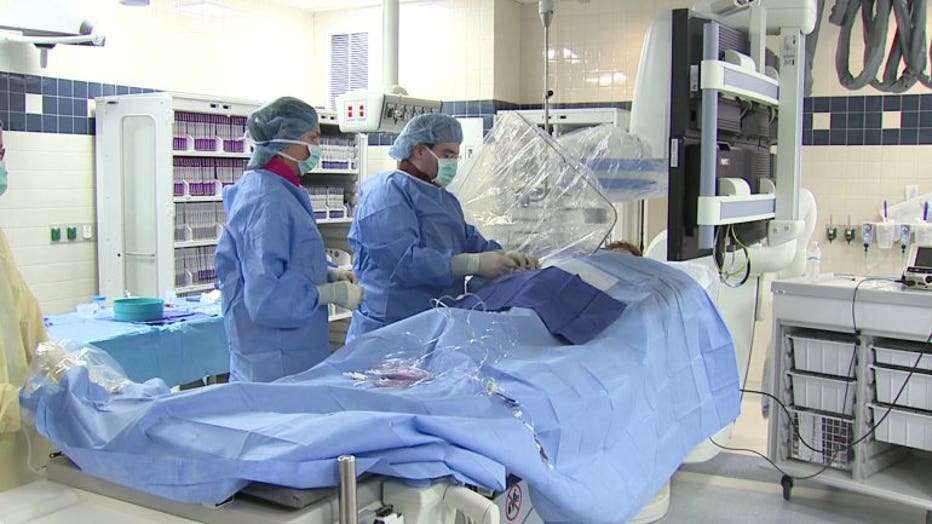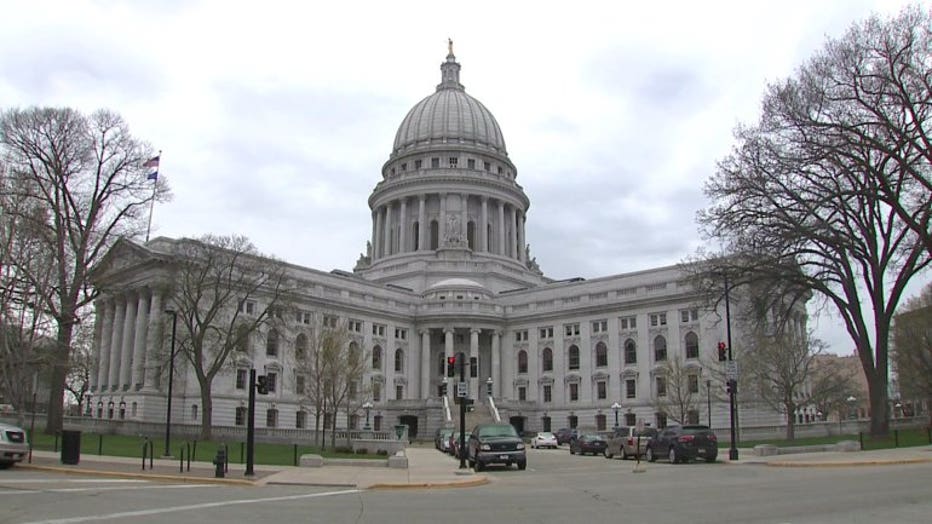'A huge loophole:' State leaders say they tried to stop last-minute changes to COVID-19 bill

Act 185
MADISON -- "It was sort of being stuck on the downside of a roller coaster," said state Senator Tim Carpenter (D-Milwaukee). "It was going very fast, I couldn't do anything to stop it, and I didn't like the ending."
Carpenter was describing his attempts to reverse last-minute changes to what is now Wisconsin Act 185, the state's COVID-19 response bill.

"To have something railroaded through - it just made me very sad because I take my job seriously," said Carpenter.
A FOX6 investigation revealed an Assembly amendment broadened civil liability immunity for health care providers in Wisconsin. Advocacy groups say the move was a necessary protection for health care workers. Lawyers and a growing number of Democratic state leaders say they are worried people will be barred from pursuing civil lawsuits in cases of medical negligence.
"This is a huge loophole," said state Representative Daniel Riemer (D-Milwaukee). "The original bill was tailored for very specific instances. Creating a much bigger loophole for much different situations is not right."
"Technical Corrections"
Assembly Speaker Robin Vos (R-Rochester) and Senate Majority Leader Scott Fitzgerald (R-Juneau) have not responded to repeated requests for comment.
On April 14, 2020, the Assembly passed an expansive COVID-19 response bill with overwhelming bipartisan support.
One of the provisions of the bill originally said a health care provider would be immune from civil liability for "actions or omissions taken in providing services to address or in response to a 2019 novel coronavirus outbreak ."
It went on to say that, in order for the health provider to qualify for immunity, the action must occur, in part, while "providing services during the state of emergency declared under s. 323.10 on March 12, 2020, by executive order 72, relating to the 2019 novel coronavirus pandemic and for 60 days following the date that the state of emergency terminates."
Vos introduced an amendment of what he described as"technical corrections," eliminating the "2019 novel coronavirus" qualifier multiple times.
Rep. Riemer, who had supported the original language of the provision, says state lawmakers only had a few minutes to look at the changes, which he believes were more substantial than technical corrections.
"When the Speaker of the Assembly uses these sort of 'procedural tricks' to present us with things that we don’t have time to understand and communicate with our constituents about, it’s a terrible way to govern," said Riemer.

The amendment passed, leaving Riemer with what he describes as a difficult decision.
"We have to make an up or down choice," said Riemer. "The amendment was bad, so I said, 'No, I do not support this amendment.' Do I support this bill that has this bad amendment in it? I made the decision that I support the bill because it made other good changes to the law.'"
The end result was a bill that went to the Senate, saying a health care provider is immune from civil liability for death or injury or for "actions or omissions" if the provider, in part, is "providing services during the state of emergency declared under s. 323.10 on March 12, 2020, by executive order 72, or the 60 days following the date that the state of emergency terminates."
Medical malpractice and personal injury lawyers interpret that to mean health care providers have immunity from civil liability during the emergency order and 60 days following its termination regardless of whether they are treating or responding to COVID-19.
"If they drop your mom and she's injured or she's killed - total immunity," said PKSD attorney Jeff Pitman, who supported the original provision of the bill that limited legal immunity to COVID-19 response. "If they give your dad the wrong medication, or they don't give him a medication and it kills him, total immunity...they broadened it so now there’s total immunity for any injury or any wrongful death."
Health care advocacy groups support the final language of the bill, but have offered conflicting interpretations. Wisconsin Medical Society said the changes don't fundamentally change the original meaning; Wisconsin Hospital Association said broad immunity is a necessary protection for health care workers during this time.
'I think it's stuck'
When the Assembly bill got to the Senate on April 15, Sen. Carpenter said he did not have much time to process the changes. Typically, he would be able to introduce what is known as a floor amendment during the session. However, the rules governing the Senate's virtual session required state lawmakers to submit amendments no later than 9am on the day of the session.
Carpenter says that was not enough time for state lawmakers to review the legislation. He tried to speak up several times during the course of the session.
"We were told that if we were to press a button, they would create a list of people that would be called on to speak," said Carpenter. "I continually pressed the buttons and they were turned off. And I would press them again and they were turned off."
"Mr. President, I’ve been pressing the button to request, to raise an inquiry," said Carpenter during the virtual session.
"Senator, all I need is a yay or a nay," interrupted Senate President Roger Roth (R-Appleton). "I’ll give you one more opportunity before I move on. Do you wish to have your vote recorded?"
"I wished to be recognized, Mr. President and you’re ignoring-" Carpenter began.
"Senator from the third, we are going to move on," Roth said.
Carpenter says he had several concerns about the Assembly bill, including the last-minute change to the health care provider immunity provision.
"I don't support any type of eliminating immunity for someone unless it’s a very rare case," said Carpenter. "That’s why I wanted to be recognized, to take down an amendment. It would have been very simple to delete that language. We could have passed it at a different time."
A spokesperson for Roth sent FOX6 a statement:
"The Committee on Senate Organization adopted a set of procedures specific to the purpose of conducting Senate business during the extraordinary session that convened in virtual session, which included a provision that amendments must be introduced before 9:00am on the day of session."
"Senate rules do not permit motions to speak during times when that request would be out of order, such as when a nondebatable motion is under consideration or during a roll call."
"The Minority Leader was physically seated next to Senator Roth during the session, which helped facilitate the debate for both the majority and minority parties."
Despite his reservations, Carpenter joined his colleagues in voting for the bill and sending it to Governor Tony Evers.
"There were quite a few things that needed to be passed in that piece of legislation," Carpenter said. "There were maybe 1,000 good pieces but there were a half dozen, dozen that were terrible. I had to try to decide between one or the other. It’s sort of damned if you do, damned if you don’t."
Carpenter says he doubts Senate or Assembly leadership will take up legislation that reverses the broadened civil liability immunity for health care providers.
"I think it’s stuck the way it is right now," Carpenter said. "I’ll be looking for any legislation that does come up. And if there’s a way of putting in there and getting a direct vote on that, I’ll certainly be looking for it."
'The legislature has more work to do'
Governor Evers' spokesperson, Melissa Baldauff, sent FOX6 an email outlining the governor's opposition to the final bill's expanded civil liability immunity for health care providers.
"First, I will say that the governor opposes this provision. He was asked to issue an executive order with the immunity provisions. He refused. He was asked to include it in his legislative package. He refused."
"We tried to work with the Legislature on having more reasonable provisions. They refused. In fact, Republican Legislative leadership rejected all the recommendations the governor had to improve their legislative package. It is also worth noting that we received information at the same time the public did on the Republican bill. Further, Republican Legislative leadership refused to engage in any negotiations or back and forth."
"The final bill was drastically different from anything the governor would have supported as a stand-alone provision. And it is drastically different from what Wisconsin needs. But despite his serious concerns about this particular provision, the governor signed the bill because it included critical, time-sensitive provisions, such as waiver authority to obtain more than $600 million in federal funding (which had a deadline from the federal government of 4/17) and the suspension of the one week unemployment insurance waiting period for folks who need this immediate relief."
"At the same time, when the governor signed the bill, he said the legislature has more work to do. This is definitely one of the areas where they can and should make some improvements."
Baldauff did not answer questions about who asked the governor to include expanded civil liability immunity provisions.
FOX6 emailed every member of the Senate and Assembly health committees. Most did not respond. Rep. Robyn Vining (D-Wauwatosa) and Rep. Debra Kolste (D-Janesville) deferred to Rep. Riemer's comments.
None of the 13 Republican senators or representatives on the Senate and Assembly health committees spoke to FOX6 about the issue. Staff for Rep. Dave Murphy (R-Greenville) emailed saying his schedule was too full for an interview; no one else responded.
"This is an important issue," Riemer said. "We need to be able to go to court , not only so that we can be compensated for the harm that you caused, but also to create the right incentive so that you don’t do it in the future."
FOX6 has repeatedly asked Speaker Vos for clarification on why he changed the language surrounding immunity for health care providers. He has not yet responded.
"I hope that you’ll continue to push them on that," Riemer said. "I think they put it in there for a reason. I think they knew what the were doing. The way they did it indicates to me that they thought it was the kind of thing that would get swept under the rug and not covered."

